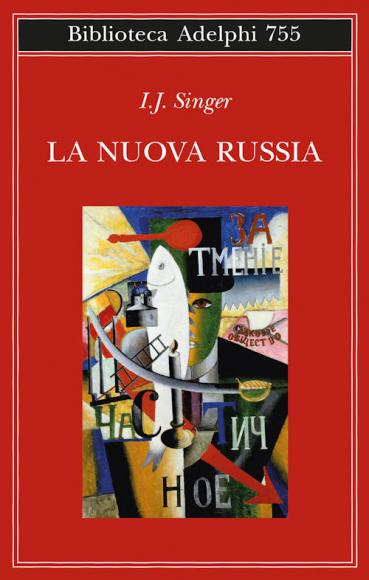Israel Joshua Singer
Ed. Adelphi
pp. 276
In these times in which Russia has returned to being at the center of the world and history, it is intriguing to read the pages that Israel Joshua Singer wrote exactly a century ago when it was sent by the New York newspaper Forverts (the newspaper founded by about fifty Yiddish socialists in April 1897 – today Jewish Daily Forward) to create a reportage that will keep him busy for months.
The year is 1926 but in reality, it is the second time that Israel Joshua Singer goes to Russia: in fact, in 1918 he went from Kiev to Moscow, in search of the sense of the Bolshevik revolution, an experience that deeply disappointed him. 1926 is, therefore, a return in a land where he had already been and everything he took from this second journey was then collected by him and published in 1928 with the title The new Russia.
In making this kind of pilgrimage, Israel Joshua Singer was in the company of others: as Francesco M. Cataluccio writes in the note at the end of the volume “several Western Jewish intellectuals went to visit and discover the Jewish world of the eastern regions of Poland, Ukraine and Belarus” (p. 270). Just one name among many: Joseph Roth, which is published in Italian Trip to Russia (Adelphi, 1981). But it is widely believed that only Singer reported in a completely sincere and direct way what he saw and experienced, despite the feeling of disappointment being common to Roth and also to another traveller, Walter Benjamin.
Il socialist paradise it existed only in partial narratives, embellished or distorted by local propaganda, while the Jewishness encountered in those lands appeared very, very distant from that of Central Europe, notably Germany.
“During my train travels, passengers often tried to guess my profession. Some took me for a commercial agent, others for a butter seller, others for a tanned leather merchant. In Bobruysk they mistook me for a forester" (p.107).
Reading these pages you experience Singer's curiosity in speaking, dialoguing and discovering the reality that was around him: “once again, old and new walk arm in arm” (p.24).
Curiosity, desire to understand “the eternal antipathy between the full and the hungry” (p. 78), tendency to ask - often even with apparently simple questions, elements of great depth emerge - and maintaining one's own thoughts and an attitude free from prejudice. Which was made easier as this was his second visit to Russia in 1926, which came a few years after the inauguration of the Novaya Ekonomičeskaja Politika, the New Economic Policy – NEP, inaugurated by Lenin in 1921.
Acute observer, even of the smallest things such as the names of the streets renamed Lenin, Stalin, Karl Marx and Revolutionary Street, he crosses “anonymous and sad cities, a landscape of factory chimneys, stone walls, malodorous fumes” (p. 121), pausing to dialogue with the innkeepers and restaurateurs whose clientele are Russian, Polish, German, Bulgarian, Moldovan, Greek, Armenian, Georgian, Syriac, Tatar, Lithuanian, Czech, Estonian, Gypsy and, naturally, Jewish .
In the cities “people live crowded together, on each door there is a sheet of paper with numbers indicating how many times each tenant has to ring” (p.128).
Odessa and Crimea emerge from these travel pages like ghosts while Singer stops to talk first with a judge and then with a psychologist (to whom two chapters are dedicated, while a third chapter is drastically titled Men), being struck by the efficiency and life of the pioneer communes. But “you can meet him everywhere – on the train, in a restaurant, in a shop. His coat is always a little threadbare, his shoes shiny but worn, his collar neat but tight, a proletarian cap on his head, which however doesn't sit there naturally..." (p. 201): he is the impoverished man, who is told about in chapter 33.
Thus, after paying homage to Lenin – “now the icon, the sacred image of the new contemporary Russia, is Vladimir Lenin” (p. 220), having visited Kiev, a city about which Singer finds it difficult to write also due to the memories that crowd his head, and having gone as far as the city of Berdičev, here is finally the return, “finally Stolbtsy, the border post – a border that separates not simply two countries, but two worlds” (p.255).
“IJ Singer's bitterly lucid conclusion, after his second and last trip to Soviet Russia, is that no trace of war communism seems to have remained” (Cataluccio, p. 276).
Israel Joshua Singer (Yisroel Yehoshua Zinger) was born in Biłgoraj on November 30, 1893 and passed away in New York on February 10, 1944.
Elder brother of Isaac Bashevis Singer (Nobel Prize for Literature in 1978, of whom Adelphi translated numerous texts), he lived in Poland (Warsaw) and the Soviet Union and emigrated in 1934 to the United States.
Israel Joshua Singer was a prolific Polish writer, author of novels and short stories in Yiddish, considered overshadowed by his brother's fame and recently rediscovered in France and then in Italy thanks to one of his novels published in 2013 The Karnowski family (Adelphi, now in thirteenth edition). The second of four children, he had a very difficult relationship with his father and soon developed his own personal vision of the world, fleeing from home so as not to have to become a rabbi: from Jewish orthodoxy he developed an enlightened soul, critical of his mother tongue (Yiddish ), and supported the Bolshevik Revolution only to walk away disappointed and embittered.
The book The new Russia is edited by Elisabetta Zevi, translated by Marina Morpurgo, and with a concluding note signed by Francesco M. Cataluccio entitled A skeptic in the country of the Soviets.
Andrea Castiello d'Antonio












